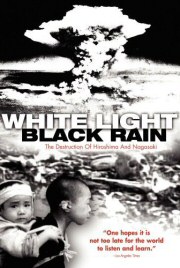 With the temperature dropping, it's time to find someone to keep you warm. Find your hookups with our online dating guide!
With the temperature dropping, it's time to find someone to keep you warm. Find your hookups with our online dating guide!
- Rated NR
- Documentary
- 2007
- DVD
Reviewed by Jeff Giles
()
ugust 6 and 9, 1945. Chances are, if you aren’t a social science major – or you weren’t paying close attention in school – you may not immediately recall why those dates are two of the most important in human history. Or, more likely, you’ve never associated them with the bombing of Hiroshima and Nagasaki, acts of war that left 210,000 corpses in their immediate wake.
It isn’t so shocking that these dates have been allowed to pass quietly in America. As a nation, we have never been particularly interested in our past, especially when examining it provokes any kind of debate. It may surprise you to know, however, that White Light/Black Rain – Steven Okazaki’s thoughtful and precise documentary of the bombs’ aftermath – begins by asking eight random passersby on a Tokyo street if they remember what those dates mean, and that none of them do.
This, in a nutshell, is the film’s raison d’être: the simple fact that such a momentous event is being allowed to fade into the history books without a fight. Once upon a time, warfare was -- for lack of a better term – a personal condition; soldiers fought face-to-face, or something very much like it, and the horrors they experienced were utterly, terribly visceral. As our war machines have made fighting cleaner and faster, however, they’ve necessarily desensitized us from their effects – even as they’ve amplified their power hundreds of times over – and this is why, for many people, the words “Hiroshima” and “Nagasaki” conjure up clinical black-and-white still shots of mushroom clouds.
Silent. Clean. Almost beautiful.
The reality of war, of course, is never beautiful; it’s unbelievably ugly, and stupid, and wasteful. White Light/Black Rain reminds us of this. It shows us, with the aid of long-suppressed archival footage from the bombs’ impact points, as well as a series of interviews with their survivors and American soldiers involved in the attacks. To say that watching this footage is harrowing would be an understatement – and to call watching it “painful” would be a serious insult to the survivors.
The bombings are a touchy subject for many who either question their necessity or vehemently believe in it; Okazaki, to his credit, recognizes that this debate – at least for the purposes of his film – is entirely moot. It doesn’t matter why the attacks happened, or whether they were right or wrong. It only matters that they did, and it matters that we see – up close, and in unflinching detail – what they did. Glance at any newspaper or spend five minutes in front of any news network, and it’s hard not to argue that this is a lesson we’re well on our way to forgetting, if we ever learned it at all.
You can follow us on Twitter and Facebook for content updates. Also, sign up for our email list for weekly updates and check us out on Google+ as well.











